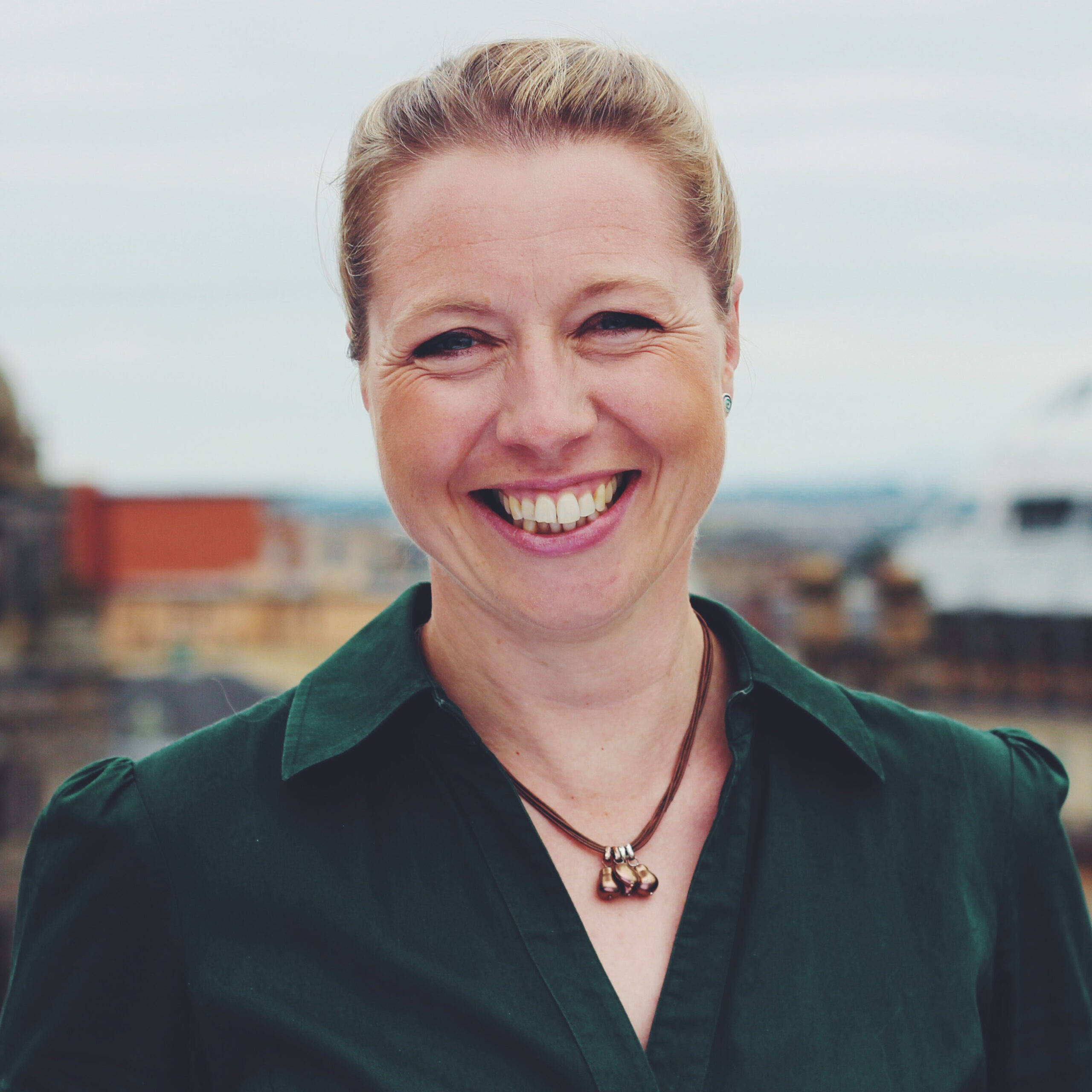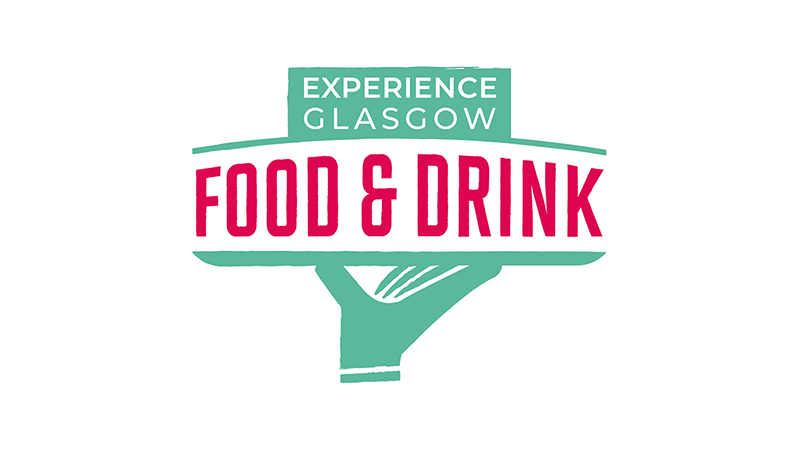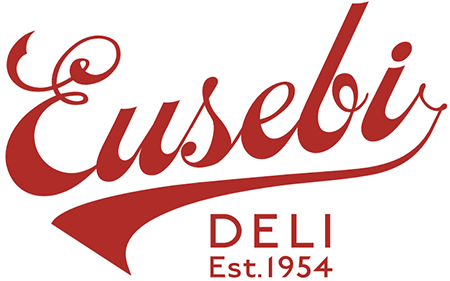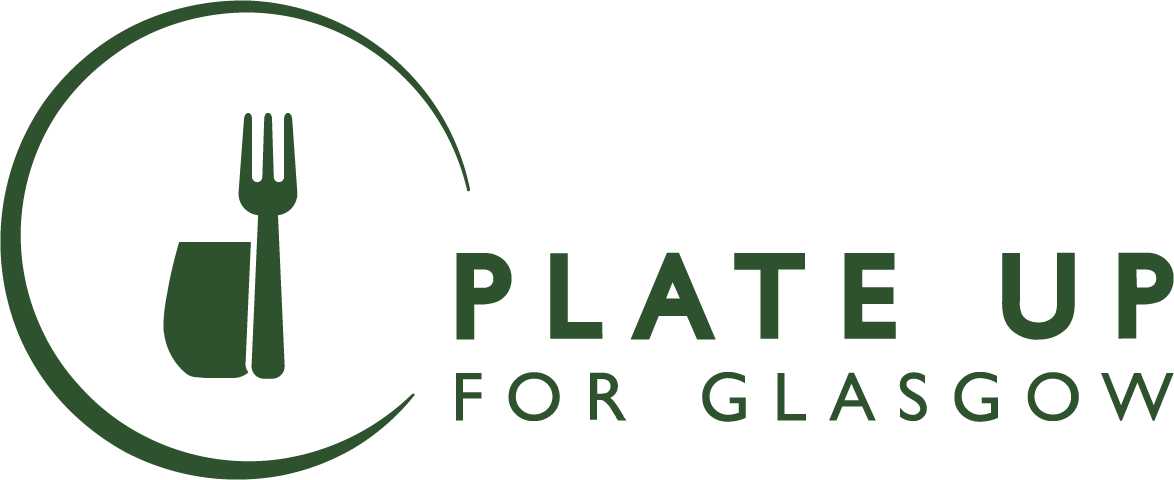Our story
Written by: Rebecca Ricketts, Campaign Lead, Plate up for Glasgow
 Like so many children, one of my earliest memories was helping my much-loved Granny in her kitchen. Baking was her thing which soon became a passion of mine too. Her pantry was always packed with a wonderful array of supplies which, quite literally, gave us food for thought as to what we could conjure up for our next meal.
Like so many children, one of my earliest memories was helping my much-loved Granny in her kitchen. Baking was her thing which soon became a passion of mine too. Her pantry was always packed with a wonderful array of supplies which, quite literally, gave us food for thought as to what we could conjure up for our next meal.
Having said that, Granny was undoubtedly an expert at avoiding food waste. No matter what we found in that cavernous store cupboard of hers it was always baked into something exciting and delicious. This love food, hate waste legacy lives on in both my father, who is still trying, undefeated, to make his way through various jars of preserves and dried provisions she left in his care, and myself, a notorious ‘meal planner’ and ‘left-over’ lover.
Building on these early lessons, sciences and home economics became my go to subjects at school. With an increased understanding of where our food comes from, the importance of good nutrition for all, alongside a growing appreciation of responsible production and consumption, I entered adulthood feeling wildly optimistic about the health of our global food system. How naive was I!
Fast forward 20 years - my role working for Circular Glasgow took me to Amsterdam, the Netherlands. After spending a day with the team at Circle Economy, global specialists in ‘circular economy’, we headed out for a bite to eat. Chinking the days productivity with a glass of Pieper Bier (beer made from surplus potatoes), we then tucked into a three-course menu made from ‘rescued food.’ Where were we? InStock, a restaurant where chefs create meals out of wasted food.
Every morning, this not-for-profit restaurant sends out its electric-powered vehicle to pick up local food that would otherwise be binned including produce such as, meat, fish, unsold bread, tofu and chocolate. Some items may have been overstocked, while others have aesthetic flaws or are nearing their sell by date. By noon, the inventive team at Instock have pulled together a three-course menu that is posted several hours later on their chalkboard.
As for the menu, it's constantly changing - chefs don't usually know what items they'll receive until it's time to get cooking! This innovative dining challenges the chefs to get creative with preparations, for example, turning cauliflower into grated couscous or bananas into ice cream. It also offers customers an exciting opportunity to sample some different and flavoursome dishes whilst taking away further hints and tips to tackle any food waste at home.
Looking to expand this restaurant model in other cities I wondered how Glasgow would rise to the challenge?
March 2020, the pandemic strikes:
The outbreak of Covid19 led to rapid shutdowns in cities right across the globe, significantly impacting the hospitality community. Cancellations of bookings, loss in revenue, and unemployment all led to the temporary closure, and in some cases the collapse, of many of our much-loved venues.
As business models pivoted so did my conversations with organisations within the food service sector. Listening instead of advising, providing empathy rather than details on the latest networking events, whilst gently signposting shell-shocked business owners and employers towards forever changing government advice and support.
Despite the disastrous human and economic consequences caused by Covid-19, the one thing that stood out for me was a real recognition from businesses that innovation would be key to building a more sustainable and resilient future. Coupled with Glasgow’s unique role as host to the UK’s biggest climate summit, I started thinking about ways that innovation could not only support a sustainable economic recovery but also showcase ways our own city's hospitality sector could commit to delivering on COP26 ambitions.
The resultant idea - Plate up for Glasgow. Well, it was originally coined ‘Get Wasted Glasgow’. However, despite its deliberate gallus Glaswegian intent, I concluded that a more corporate tone was probably order of the day!
Plate up for Glasgow is a hospitality industry led campaign scheduled to coincide with COP26. The campaign aims to highlight and encourage Glasgow city-based hospitality businesses to act upon the global issue of food waste and its impact on climate change.
Did you know that food waste corresponding to an average cost of £10,000 per outlet, costs the Scottish hospitality industry approximately £212 million annually and that it’s also a bigger cause of climate change than plastics? No, neither did I!
The campaign's ambition is to challenge traditional and often wasteful dining out or take away business models with the aim of sending as little food waste as possible to landfill.
Throughout the month-long campaign, diners can look forward to sampling a whole range of sustainable ‘Food Hero’ dishes and drinks, designed to showcase at least one of four food waste reduction techniques: rethinking existing menu items; showcasing food preservation techniques; using unfashionable cuts of meat and or creating a dish from surplus or donated food.
Having settled on the concept, my next move was to sense-check the idea with those who work within the hospitality sector. Conscious that we were still mid-pandemic, I braced myself for knock back, after knock back. Instead, I was dumbfounded by the level of interest, support and offers from leading restaurant owners and head chefs all keen to back the campaign. This was core to the campaign, an initiative led by the hospitality sector, for the hospitality sector.
Bolstered by the industry’s positive feedback, funding, and wider team support to pilot the concept was then secured from partners Experience Glasgow Food and Drink and Glasgow Chamber of Commerce.
With the campaign idea, stakeholder-buy-in and funding firmly in place, the only thing that was missing was a team of enthusiastic waste food warriors to help me deliver it.
In addition to supporting our hospitality sector to build-back better, I was also keen to position Plate up for Glasgow as a way of supporting youth employment, yet another sector of the population put under significant strain from the pandemic. Within the first two weeks, the team grew from one to five individuals, with the arrival of Fiona, Hatty, Jess and Scott. Six weeks in and we welcomed Jenn, Lisa and Mhairi.
By coming together, we can all benefit in two substantial ways. Firstly, businesses stand a better chance of rebuilding post pandemic and learning, collaboratively, how to become sustainable for the long term. Secondly, young people gain an invaluable opportunity in building essential skills to thrive in a net zero economy.
A city-wide campaign designed for all, why don’t you check out plateupforglasgow.co.uk to see how you too can get involved.
Make a difference one dish at a time.
Thanks to partners & funders:


A special thanks also goes to Giovanna Eusebi, owner of Eusebi Debi and Restaurant. Giovanna was the first to see the potential in the idea and has been a constant champion for the wider hospitality sector.

